As a healthcare professional, I’m deeply passionate about addressing the critical issue of sexually transmitted diseases (STDs). These diseases are a big public health concern, affecting millions of people around the world. In this article, I aim to give you a full understanding of STDs, how to prevent them, and the best ways to treat them.
STDs can greatly affect a person’s physical, emotional, and mental health. They can cause discomfort, social stigma, and mental health issues. But with more awareness, early detection, and proper treatment, we can lessen the impact of STDs and improve overall sexual health.
Key Takeaways
- Sexually transmitted diseases are a critical public health concern, affecting millions worldwide.
- Early detection and proper management of STDs are essential for maintaining physical, emotional, and mental well-being.
- Increased awareness and education are crucial in preventing the spread of STDs and reducing the associated stigma.
- Regular testing and the adoption of safe sex practices can significantly reduce the risk of contracting or transmitting STDs.
- Comprehensive treatment options, including antibiotic and antiviral therapies, are available to effectively manage and treat various STDs.
Introducing Sexually Transmitted Diseases
Sexually transmitted diseases, or STDs, are infections spread through sexual contact. They can greatly affect public health, impacting people’s physical, emotional, and social well-being. It’s important to know the common STDs and how they spread to keep sexual health in check.
Defining STDs and Their Impact
STDs, also called sexually transmitted infections (STIs), come from various sexual activities. They can be caused by bacteria, viruses, or parasites. If not treated, they can lead to infertility, chronic health problems, and even life-threatening issues.
Common Types of STDs
Some common sexually transmitted diseases include:
- Chlamydia: A bacterial infection that can cause pelvic inflammatory disease, infertility, and other issues if not treated.
- Gonorrhea: A bacterial infection affecting the genitals, rectum, and throat. It can cause serious health problems if not treated.
- Syphilis: A bacterial infection with several stages. If left untreated, it can lead to long-term health issues.
- Herpes: A viral infection causing painful blisters or sores on the genitals, rectum, or mouth. It can spread even without symptoms.
- Human Papillomavirus (HPV): A group of viruses causing genital warts and certain cancers, like cervical, anal, and oropharyngeal cancer.
These are just a few examples of STDs that can affect individuals and communities. Knowing about these infections and how they spread is key to promoting sexual health and well-being.
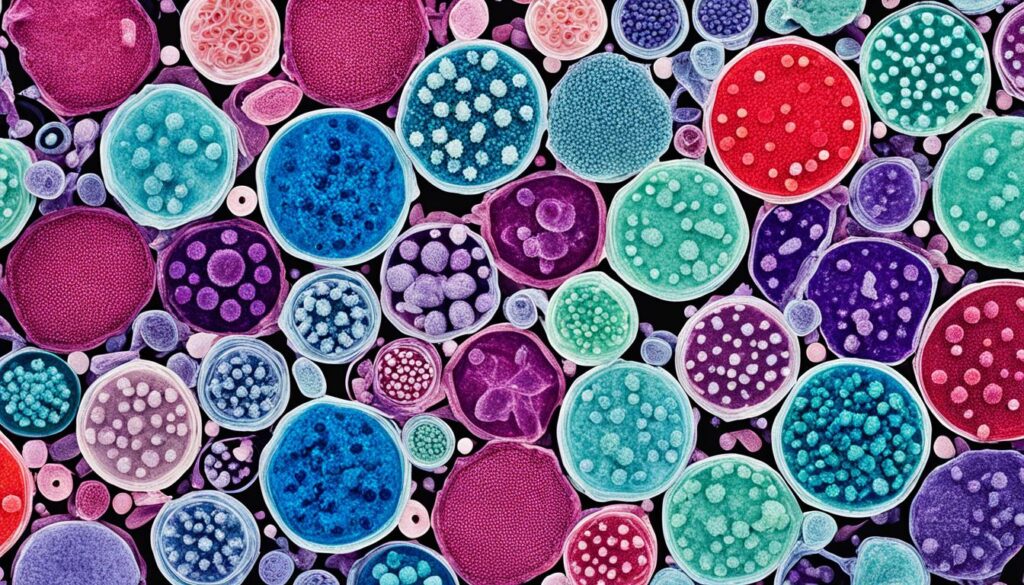
STDs prevention, sexually transmitted diseases, STD symptoms, safe sex
It’s crucial to protect yourself from sexually transmitted diseases (STDs) for good sexual health. Knowing how to prevent them and spotting their symptoms early can help. This way, you can keep yourself and your partners safe.
Safe sex practices are key to preventing STDs. Using condoms correctly and consistently can greatly lower the risk of getting or spreading diseases. Also, being in monogamous relationships and getting tested regularly can boost your sexual health.
It’s vital to know the symptoms of STDs. Catching them early means you can get treatment fast and stop them from spreading. Symptoms include unusual discharge, pain when you pee, sores, and rashes. If you notice anything odd, see a doctor right away.
- Consistent and proper use of condoms
- Engaging in mutually monogamous relationships
- Regular STD testing
- Recognizing common STD symptoms, such as unusual discharge, pain during urination, and sores or lesions
| Safe Sex Practices | STD Symptom Awareness |
|---|---|
| Consistent condom use | Unusual discharge |
| Mutual monogamy | Pain or burning during urination |
| Regular STD testing | Sores or lesions |
| Unexplained rashes or irritation |
Putting a focus on preventing STDs, practicing safe sex, and knowing the signs of infections helps keep your sexual health in check. This is good for you and those you care about.

“Protecting your sexual health is a shared responsibility – it’s about taking care of yourself and those you care about.”
Risk Factors and Transmission
It’s important to know the risk factors for sexually transmitted diseases (STDs) to prevent them. High-risk behaviors like not using condoms, having many partners, and using drugs can spread STDs.
High-Risk Sexual Behaviors
Not using condoms during sex greatly increases the chance of getting an STD. This is because it lets bodily fluids mix, which can spread infections like HIV and chlamydia. Also, having many partners can make you more likely to get different STDs.
- Unprotected sexual intercourse
- Having multiple sexual partners
- Intravenous drug use
Using drugs and sharing needles can spread STDs like HIV and hepatitis C. This happens when infected blood gets shared through contaminated needles.
Knowing and avoiding risky behaviors is key to stopping STDs. By understanding the risks, people can make better choices to protect themselves and others.

“The best protection against STDs is to avoid high-risk sexual behaviors and to get regularly tested.”
Recognizing STD Symptoms
Knowing the signs of sexually transmitted diseases (STDs) is key to getting help fast and stopping infections from spreading. These signs can include things like genital warts and unusual discharge. It’s also important to notice how an STD can affect your mental health.
Physical Signs and Symptoms
STDs can show up in many ways, from mild to severe. Some signs are:
- Unusual genital, anal, or oral discharge
- Itching, burning, or pain during urination
- Sores, blisters, or rashes on the genitals, anus, or mouth
- Swollen lymph nodes in the groin area
- Fever, chills, and body aches
Some STD symptoms are easy to spot, but others might be hidden or not show up at all. That’s why it’s important to get tested regularly to keep your sexual health in check.
Emotional and Mental Health Impacts
Getting an STD diagnosis can really stress you out, causing anxiety and even depression. The fear of being judged can make you feel ashamed, alone, and scared. But, talking to doctors, counselors, or friends can help you deal with these feelings.
Spotting the signs of STDs is the first step to taking care of your sexual health. By knowing what to look for and getting help right away, you can manage your condition, stop it from spreading, and focus on your health.
The Importance of Regular STI Testing
Keeping your sexual health in check is key to your overall well-being. Regular STI testing is crucial. It helps find infections early and starts treatment right away. This is not just good for your health but also helps stop STDs from spreading in our communities.
When you test for STIs often, you can catch them early. This means you can get the right treatment fast. It keeps you healthy and helps stop the spread of infections to others. This is a big step in being responsible and caring for your sexual health.
- Regular STI testing helps detect infections early, when they’re easiest to treat.
- Getting treatment for STIs quickly can prevent serious health problems later.
- Testing often encourages open talks about sexual health and shared responsibility.
It doesn’t matter how often you’re sexually active or how much you think you’re at risk. Making STI testing a regular part of your health routine is important. It helps you and your community stay healthy. By testing often, you’re looking out for your health and helping everyone around you.
| Benefits of Regular STI Testing | Potential Consequences of Untested STIs |
|---|---|
|
|
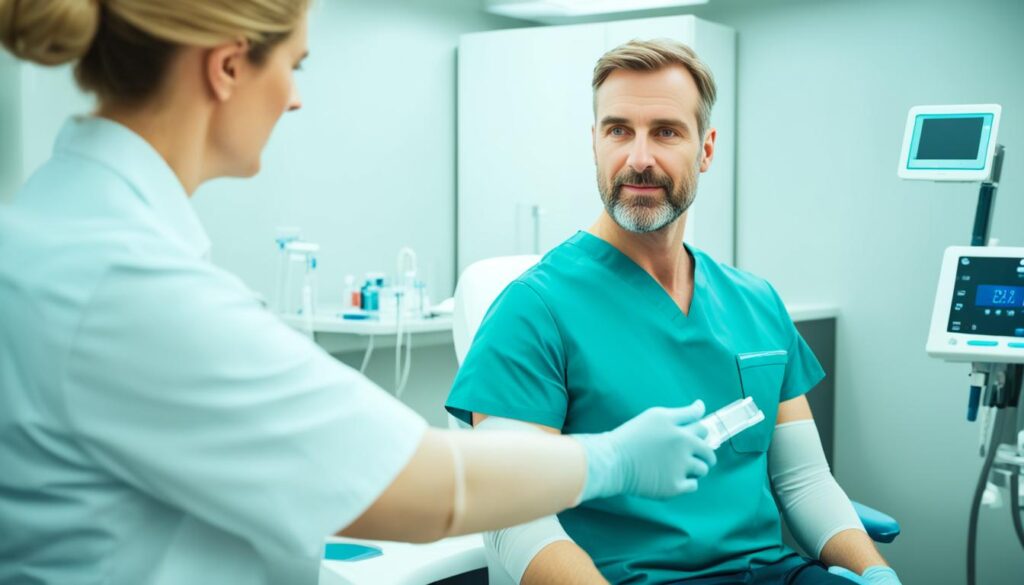
In conclusion, regular STI testing is key to keeping your sexual health in check. It helps everyone stay healthy and reduces STD spread. By making this a priority, we can all live healthier, happier lives.
Safe Sex Practices
Practicing safe sex is key for good sexual health and lowering the risk of sexually transmitted diseases (STDs). Key parts of safe sex include using condoms right and being in monogamous relationships with mutual testing.
Condom Usage and Negotiation
Condoms are very effective in stopping STDs if used right. It’s vital to talk about condom use with your sexual partners. Make sure you both agree and understand the boundaries before doing anything sexual. This way, you both know what’s expected and can have safer sex.
- Always use condoms correctly, from start to finish, during any sexual encounter.
- Negotiate condom usage with partners in a respectful and non-judgmental manner.
- Keep an adequate supply of condoms on hand to ensure they are readily available.
Monogamy and Mutual Testing
Being in a monogamous relationship means you’re only with one person. This can greatly lower the risk of getting STDs. Adding regular STD tests for both partners makes it even safer.
- Discuss the benefits of monogamy and mutual testing with your partner.
- Schedule regular STD screenings and share test results openly and honestly.
- Commit to being faithful and maintaining the integrity of the monogamous relationship.
Using safe sex practices like always wearing condoms and being in monogamous relationships with regular tests can really cut down the risk of getting or spreading STDs. These steps, along with talking openly and caring for your sexual health, are key for a happy and healthy love life.

“Safe sex is not just about protecting yourself, but about respecting and caring for your partner’s well-being as well.”
Seeking Medical Attention
When it comes to your sexual health, getting medical help quickly is key. If you notice any signs of STDs or have health worries, talk to a healthcare provider. They can offer the right advice and support.
Healthcare Provider Consultation
Going to a healthcare provider, like an STD medical care expert or your main doctor, is the first step. In a healthcare provider consultation, you can look forward to:
- Talking openly about your sexual history and any symptoms you have
- A physical check-up to look for any signs or issues
- Tests, like blood tests or swabs, to see if you have an STD
- A treatment plan made just for you, which might include medicine or more checks
- Advice on how to prevent future risks and learn about sexual health
Your healthcare provider is there to help you, not judge you. They know these topics are private and aim to give caring, non-judgmental care.
“The first step in addressing any STD-related issue is to have an open and honest discussion with a healthcare provider.”
By getting STD medical care and talking to a healthcare provider, you can manage your sexual health well. Make sure to get the right treatment quickly. Don’t let fear or shame stop you from looking after your health.
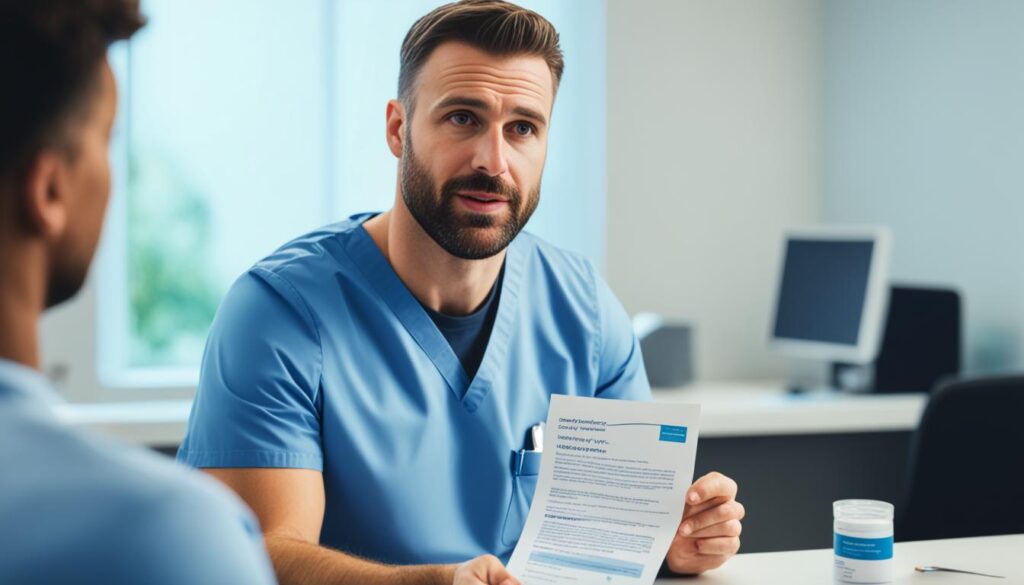
Antibiotic and Antiviral Treatments
Dealing with sexually transmitted diseases (STDs) can feel overwhelming. But, there is hope. Modern medicine has given us effective treatments like antibiotics and antivirals to fight and cure STDs.
STD treatment often involves antibiotics. These drugs target and kill the bacteria behind chlamydia, gonorrhea, and syphilis. It’s key to finish the antibiotic course your doctor prescribes to clear the infection and avoid more problems.
Antiviral treatments are for viral STDs like herpes and HIV. These drugs slow down the virus, helping to control the infection and lower the chance of passing it on. Sticking to the treatment plan is vital for managing these ongoing conditions.
| STD | Antibiotic Treatment | Antiviral Treatment |
|---|---|---|
| Chlamydia | Azithromycin or Doxycycline | Not applicable |
| Gonorrhea | Ceftriaxone, Azithromycin, or Doxycycline | Not applicable |
| Syphilis | Penicillin, Doxycycline, or Ceftriaxone | Not applicable |
| Herpes | Not applicable | Acyclovir, Valacyclovir, or Famciclovir |
| HIV | Not applicable | Combination of antiretroviral medications |
STD treatment is tailored to each person. Your doctor will look at your situation and recommend the best treatment for your STD.
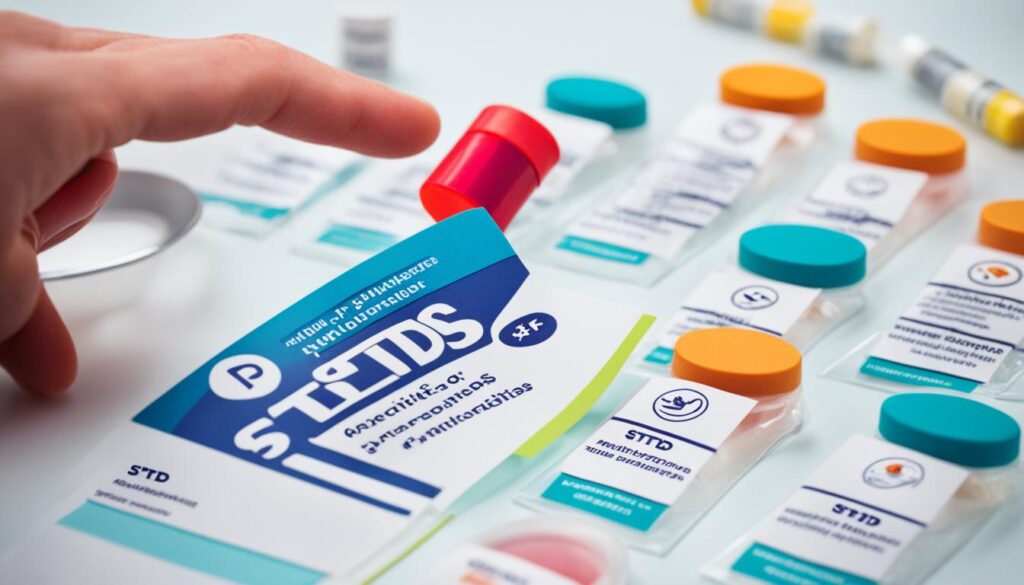
Knowing how antibiotics and antivirals help manage STDs lets you take charge of your sexual health. Getting professional advice and following your treatment plan are key to getting better and stopping the spread of infections.
Partner Notification and Disclosure
Telling your partner about a sexually transmitted disease (STD) can be tough. It’s a key step in taking care of your sexual health and stopping infections from spreading.
Ethical Considerations
Telling your partner you have an STD brings up many ethical thoughts. You have a duty to tell them to help them make good health choices. But, you must do it with kindness, respect, and keeping things private to protect everyone’s feelings.
Navigating Difficult Conversations
- Be kind and understanding, thinking about how your partner might feel.
- Give them all the facts about the STD, how it spreads, and why testing and treatment are important.
- Encourage your partner to see a doctor and offer to go with them or give them support resources.
- Let your partner decide who to tell about the STD, without pushing them.
- If talking about it is hard, get help from health experts or support groups.
When you talk about partner notification and STD disclosure with care and respect, you help lessen the shame around these topics. This can make your community’s sexual health better.

| Ethical Considerations | Navigating Difficult Conversations |
|---|---|
|
|
“Being open is not just a personal duty, but key to keeping our communities healthy.”
By thinking about ethical thoughts and hard talks on partner notification and STD disclosure, we all help keep sexual health up and stop infections from spreading.
Preventive Measures: HPV Vaccination
The HPV vaccine is a key way to prevent some sexually transmitted diseases (STDs). It has changed the game in fighting HPV, which can cause cancer. This includes cervical, anal, and oropharyngeal cancers.
It’s especially important for teens and young adults to get the HPV vaccine. It works best when given at a young age. By getting vaccinated, people can lower their risk of getting HPV and its health problems. The vaccine is safe, easy to get, and doctors highly recommend it for good sexual health and STD prevention.
The CDC says the HPV vaccine is best for people aged 11-12. But, catch-up vaccines are available for those up to 26 years old. Also, people up to 45 can get the vaccine, giving a second chance for those who missed it earlier.
| Age Group | Recommended HPV Vaccination Schedule |
|---|---|
| 11-12 years old | 2-dose series (6-12 months apart) |
| 15-26 years old | 3-dose series (0, 1-2, 6 months) |
| 27-45 years old | Shared clinical decision-making between patient and provider |
Getting the HPV vaccine is a smart move for your sexual health. It helps lower STD rates in communities. Along with safe sex practices, it makes society healthier and more informed about STDs.
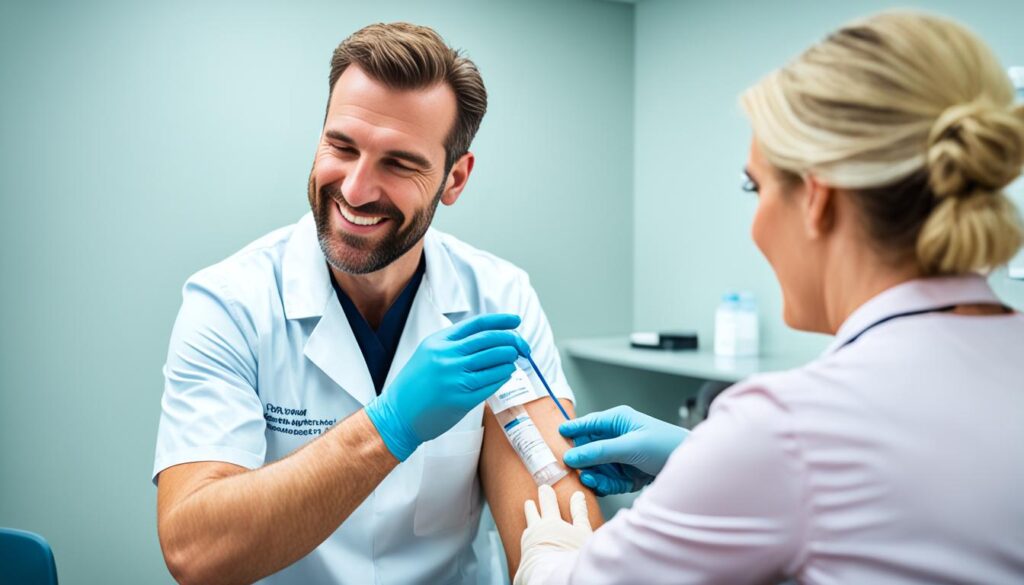
“The HPV vaccine is a safe and effective way to protect against certain types of HPV that can lead to cancer. Vaccination is recommended for both boys and girls starting at age 11 or 12, but can be given up to age 45.”
Sexual Health Education and Awareness
Comprehensive sexual health education and awareness campaigns are key to tackling STD challenges. They help by encouraging open talks and lowering the STD stigma. This way, people can make smart choices about their sexual health and well-being.
Promoting Open Dialogue
To boost STD awareness, we need to make talking about sexual health easy and safe. This means starting educational programs that make these topics normal. It also means offering resources that are easy to get and don’t judge.
Reducing Stigma and Discrimination
STD stigma and discrimination stop many from getting tested and treated. By reducing stigma, we can make a place where everyone feels safe to get help. We can do this with special awareness campaigns, supporting groups, and building a caring community.
- Implement comprehensive sexual health education programs in schools and communities.
- Develop public awareness campaigns that destigmatize STDs and promote a culture of openness and understanding.
- Advocate for policies and legislation that protect the rights and well-being of individuals affected by STDs.
- Provide accessible and non-judgmental testing and treatment services, along with emotional and mental health support.
“By addressing the root causes of stigma and discrimination, we can create a society where everyone feels empowered to prioritize their sexual health and well-being.”
Dealing with STDs requires a plan that includes education, support, and a focus on inclusivity. By working together, we can make a place where everyone’s sexual health and well-being matter.
Emotional and Mental Health Support
Getting an STD diagnosis can be scary and overwhelming. It often leads to emotional and mental health issues. It’s important to understand the mental effects of having an STD and find support to help you through it.
Dealing with the stigma, anxiety, and depression that come with an STD is tough. But, there are people and places that can offer emotional support. They can help you handle the mental health side of your condition.
- Counseling and Therapy: Talking to a mental health expert, like a therapist or counselor, is very helpful. They can help you deal with your feelings, find ways to cope, and understand the mental effects of an STD.
- Support Groups: Joining groups with others who have gone through similar things can make you feel less alone. It can give you a sense of community and a safe place to talk about your STD mental health struggles.
- Self-Care Practices: Doing things for yourself, like practicing mindfulness, meditating, or exercising, can help you manage stress and improve your overall well-being.
You are not alone in this journey. Looking for the right emotional support and taking care of your mental health can really help you face the challenges. It can also help you live a fulfilling life.
“The courage to be is the courage to accept oneself, in spite of being unacceptable.”
– Paul Tillich
| Resource | Description | Contact Information |
|---|---|---|
| SAMHSA National Helpline | Free, confidential, 24/7 treatment referral and information service for individuals and families facing mental and/or substance use disorders. | 1-800-662-HELP (4357) |
| National Suicide Prevention Lifeline | Provides 24/7 free and confidential support for people in distress, prevention and crisis resources for you or your loved ones. | 1-800-273-8255 |
| CDC National Prevention Information Network | Connects people to STD/HIV prevention services, including testing locations, educational resources, and support services. | 1-800-458-5231 |
Conclusion
In this guide, we’ve looked at the key parts of sexually transmitted diseases (STDs). We talked about how to prevent them, spot them early, and treat them well. The main point is that being proactive and talking openly is crucial for good sexual health and fighting STDs.
Regular STD tests, safe sex practices, and quick medical help are key. They help us make smart choices and take charge of our sexual health. By creating a supportive environment and lowering the stigma around STDs, we push for better sexual health. This encourages more people to look after their health and get the help they need.
Stopping and managing STDs is a team effort. By learning together, spreading the word about sexual health, and supporting each other, we can make a healthier society. Everyone gets the info and tools to protect themselves and their partners. Let’s keep talking and acting together to boost STD prevention, STD treatment, and sexual health.

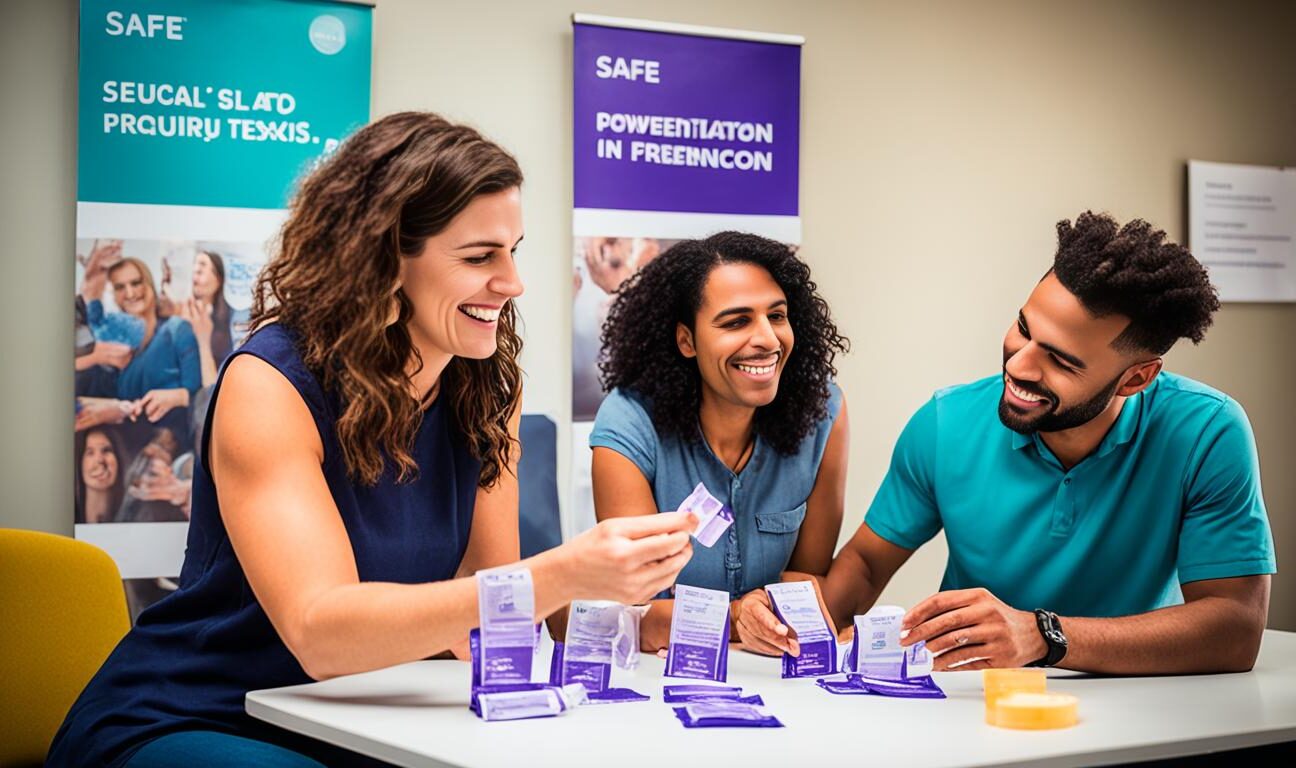




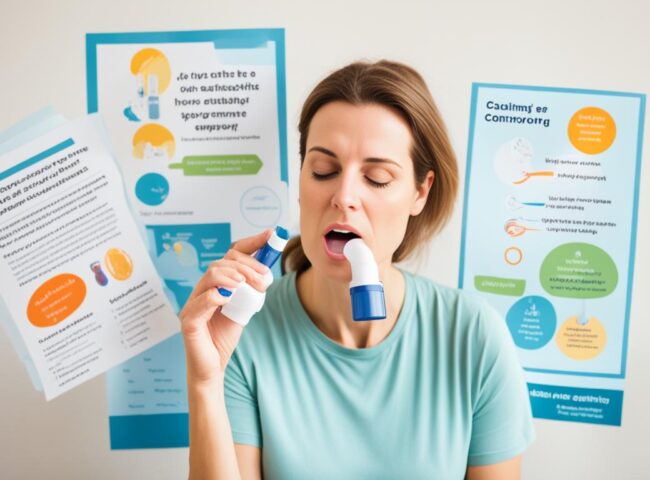
Leave feedback about this